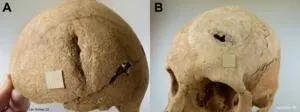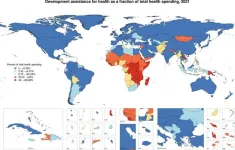(Press-News.org) More accurately predicting periods of increased hurricane activity weeks in advance may become possible due to new research published this month.
The study, led by the U.S. National Science Foundation National Center for Atmospheric Research (NSF NCAR), shows that twice as many hurricanes form two days after the passing of large-scale atmospheric waves called Kelvin waves than in the days before. This finding may enable forecasters and emergency managers to anticipate clusters of hurricanes days to weeks in advance.
The research team used an innovative computer modeling approach to tease out the influence of Kelvin waves, which are large-scale atmospheric waves that can extend more than 1,000 miles in the atmosphere and shape global weather patterns.
“If weather forecasters can detect a Kelvin wave over the Pacific Ocean, for example, then they can anticipate that a few days after the wave there will be an uptick in hurricanes forming over the Atlantic,” said NSF NCAR scientist Rosimar Rios-Berrios, the lead author of the paper. “This would help them communicate with emergency managers and local governments who could prepare for the likelihood of an active hurricane period and alert the public. This research has the potential to save many lives.”
The study was published in Monthly Weather Review.
Aquaplanet
For decades, scientists have noticed that hurricanes form in clusters followed by several weeks of little to no hurricane activity. Several studies have suggested that Kelvin waves could be responsible for the surge in hurricanes, but scientists were unable to separate out other potential factors and prove Kelvin waves were responsible. To overcome this, Rios-Berrios and her colleagues used a novel combination of computer modeling tools to confirm that Kelvin waves do indeed boost hurricane formation.
The research team used a simulation called aquaplanet that was run on NSF NCAR’s Model for Prediction Across Scales (MPAS), which is a next-generation computer model that can capture fine-scale weather phenomena and global-scale atmospheric patterns simultaneously. Aquaplanet is a configuration that simulates a hypothetical world that behaves like Earth, but doesn’t have land or seasons. The simplified world acts like a lab and makes it easier to isolate the effects of Kelvin waves on hurricane formation.
The scientists ran the simulations on the Cheyenne supercomputer at the NCAR-Wyoming Supercomputing Center.
To investigate the connection between Kelvin waves and hurricanes, the research team measured the number of days between hurricane formation and Kelvin wave crests. The measurements showed a significant peak after two days, with hurricane development being twice as likely. Because the aquaplanet simulations capture the physical process of hurricane formation, the results go beyond correlation and suggest that Kelvin waves are actually impacting hurricane formation.
The new study also emphasizes the importance of recent research that Rios-Berrios co-authored with NSF NCAR postdoc Quinton Lawton about the need to improve the ability of weather forecast models to simulate Kelvin waves.
“I started this research on Kelvin waves in 2017. It was a big project that took years to go from an idea to scientific results and really highlights why this type of research is so valuable,” said Rios-Berrios. “There are still a lot of gaps in scientific knowledge about how hurricanes form and research like this helps us narrow where scientists should focus to better understand these powerful storms.”
About the article:
Title: Modulation of tropical cyclogenesis by convectively coupled Kelvin waves
Authors: Rosimar Rios-Berrios, Brian Tang, Christopher Davis, and Jonathan Martinez
Journal: Monthly Weather Review
Web | X | Instagram | Facebook
This material is based upon work supported by the NSF National Center for Atmospheric Research, a major facility sponsored by the U.S. National Science Foundation and managed by the University Corporation for Atmospheric Research. Any opinions, findings and conclusions or recommendations expressed in this material do not necessarily reflect the views of NSF.
END
Making waves in hurricane prediction
New research may lead to more accurate forecasting of active hurricane periods
2024-08-28
ELSE PRESS RELEASES FROM THIS DATE:
Autistic traits, behavioral problems in 7-year-olds linked with gender nonconforming play
2024-08-28
Gender nonconformity in 7-year-olds — as measured by levels of gender-conforming play — may be associated with autistic traits and behavioral difficulties in girls, and with peer relationship problems in boys, according to a new study published August 28, 2024 in the open-access journal PLOS ONE by Marlene Stratmann of Karlstad University, Sweden, and colleagues.
Gender nonconformity (GNC) refers to variations in gender expression from societal and cultural gender norms. In childhood, GNC can manifest itself in several ways, including play behavior, peer relationships, clothing, and body language. Childhood GNC does not directly indicate developing gender ...
Geographic differences in US homicide rates have decreased since the 1970s
2024-08-28
A new study finds that, counter to expectations, geographic disparities in rates of homicides in the US have decreased in recent decades. Richard Boylan of Rice University in Houston, Texas, US, presents these findings in the open-access journal PLOS ONE on August 28, 2024.
Since the 1970s, gaps in economic and social wellbeing between Americans living in different regions have grown. Some researchers hypothesize that areas with reduced economic and social well-being would see higher rates of violent crime. For instance, impoverished areas with lower tax bases might receive less police protection, ...
Lackluster prioritization of the health sector in government spending and dwindling donor contributions drive slow growth in health spending in Sub-Saharan Africa
2024-08-28
Slow growth in health sector spending is projected in Sub-Saharan Africa as reported in a study published in the open access journal, PLOS Global Public Health. The decline is expected to continue to 2050, according to Angela E Apeagyei and researchers at the Institute for Health Metrics and Evaluation, University of Washington, Seattle, and is driven by tepid growth in the share of government spending that is allocated to health and reductions in development assistance for health.
The research analyses data from databases covering development assistance for health, global health spending and gross domestic spending (GDP) per capita ...
People experiencing relatively mild cases of mental ill-health may be perceived differently by others depending on whether or not diagnostic labels are provided
2024-08-28
Diagnostic labels for people experiencing what some consider to be relatively milder forms of mental-ill health may affect how others perceive them for better and worse, according to a study published August 28, 2024 in the open-access journal PLOS Mental Health by Nick Haslam from the University of Melbourne, Australia, and colleagues.
In recent years, there’s been a general shift to increased diagnoses of mental ill-health. Here, Haslam and colleagues investigate the implications of diagnosing individuals presenting with ...
Unhealthy commodities—like alcohol and social media—are connected with poor mental health
2024-08-28
“Unhealthy commodities” such as tobacco, alcohol, ultra-processed foods, social media, and fossil fuels, as well as impacts of fossil fuel consumption such as climate change and air pollution are associated with depression, suicide, and self-harm, according to a study published August 28 by Kate Dun-Campbell from the London School of Hygiene & Tropical Medicine, and colleagues.
Globally, around one out of every eight people currently live with a mental health disorder. These disorders—including depression, suicide, anxiety, and other diseases and disorders—can have many underlying causes. ...
Bacterial cells transmit memories to offspring
2024-08-28
Bacterial cells can “remember” brief, temporary changes to their bodies and immediate surroundings, a new Northwestern University and University of Texas-Southwestern study has found.
And, although these changes are not encoded in the cell’s genetics, the cell still passes memories of them to its offspring — for multiple generations.
Not only does this discovery challenge long-held assumptions of how the simplest organisms transmit and inherit physical traits, it also could be leveraged for new medical applications. For example, researchers could circumvent antibiotic resistance by subtly tweaking a pathogenic ...
Dogs understand words from soundboard buttons, study reveals
2024-08-28
If you’ve seen those viral social media videos of dogs using soundboard buttons to “talk,” you’re not alone. These buttons have taken the pet world by storm, leading to impressive and sometimes seemingly miraculous feats shared across platforms like TikTok and Instagram. But are these dogs truly communicating, or are they just responding to cues from their owners?
Now, a new study published in PLOS ONE – by researchers from the University of California San Diego and other institutions – ...
New pancreatic cancer treatment proves effective in shrinking, clearing tumors
2024-08-28
Researchers at the University of Massachusetts Amherst and UMass Chan Medical School have demonstrated in mice a new method to combat pancreatic cancer. The study, published in Science Translational Medicine, outlines the synergistic effects of a novel nanoparticle drug-delivery system to activate an immune pathway in combination with tumor-targeting agents.
Pancreatic ductal adenocarcinoma (PDAC) is the most common form of pancreatic cancer. With a dismal,13% five-year survival rate, it is the third leading cause of cancer deaths.
One major ...
Study reveals isolation, endogamy and pathogens in early medieval Spanish community
2024-08-28
An archaeogenetic study sheds new light on the isolated medieval community Las Gobas in northern Spain. Besides isolation and endogamy, the researchers have also identified the variola virus which can offer a new explanation on how smallpox entered Iberia.
Researchers from Sweden and Spain have conducted a comprehensive archaeogenetic study on a community that lived on the border between the northern Christian kingdoms and Al-Andalus during the early Medieval period. This dynamic era, especially ...
Chromosome copying errors pinpointed in embryo development
2024-08-28
A new discovery by researchers at the RIKEN Center for Biosystems Dynamics (BDR) in Japan upends decades of assumptions regarding DNA replication. Led by Ichiro Hiratani and colleagues, the experiments published August 28 in Nature show that DNA replication in early embryos is different from what past research has taught, and includes a period of instability that is prone to chromosomal copying errors. As failed pregnancies and developmental disorders are often related to chromosomal abnormalities the findings could impact the field of reproductive medicine, perhaps leading to improved methods of in vitro fertilization (IVF).
During embryogenesis, ...
LAST 30 PRESS RELEASES:
This ancient plant-eater had a twisted jaw and sideways-facing teeth
Jackdaw chicks listen to adults to learn about predators
Toxic algal bloom has taken a heavy toll on mental health
Beyond silicon: SKKU team presents Indium Selenide roadmap for ultra-low-power AI and quantum computing
Sugar comforts newborn babies during painful procedures
Pollen exposure linked to poorer exam results taken at the end of secondary school
7 hours 18 mins may be optimal sleep length for avoiding type 2 diabetes precursor
Around 6 deaths a year linked to clubbing in the UK
Children’s development set back years by Covid lockdowns, study reveals
Four decades of data give unique insight into the Sun’s inner life
Urban trees can absorb more CO₂ than cars emit during summer
Fund for Science and Technology awards $15 million to Scripps Oceanography
New NIH grant advances Lupus protein research
New farm-scale biochar system could cut agricultural emissions by 75 percent while removing carbon from the atmosphere
From herbal waste to high performance clean water material: Turning traditional medicine residues into powerful biochar
New sulfur-iron biochar shows powerful ability to lock up arsenic and cadmium in contaminated soils
AI-driven chart review accurately identifies potential rare disease trial participants in new study
Paleontologist Stephen Chester and colleagues reveal new clues about early primate evolution
UF research finds a gentler way to treat aggressive gum disease
Strong alcohol policy could reduce cancer in Canada
Air pollution from wildfires linked to higher rate of stroke
Tiny flows, big insights: microfluidics system boosts super-resolution microscopy
Pennington Biomedical researcher publishes editorial in leading American Heart Association journal
New tool reveals the secrets of HIV-infected cells
HMH scientists calculate breathing-brain wave rhythms in deepest sleep
Electron microscopy shows ‘mouse bite’ defects in semiconductors
Ochsner Children's CEO joins Make-A-Wish Board
Research spotlight: Exploring the neural basis of visual imagination
Wildlife imaging shows that AI models aren’t as smart as we think
Prolonged drought linked to instability in key nitrogen-cycling microbes in Connecticut salt marsh
[Press-News.org] Making waves in hurricane predictionNew research may lead to more accurate forecasting of active hurricane periods











